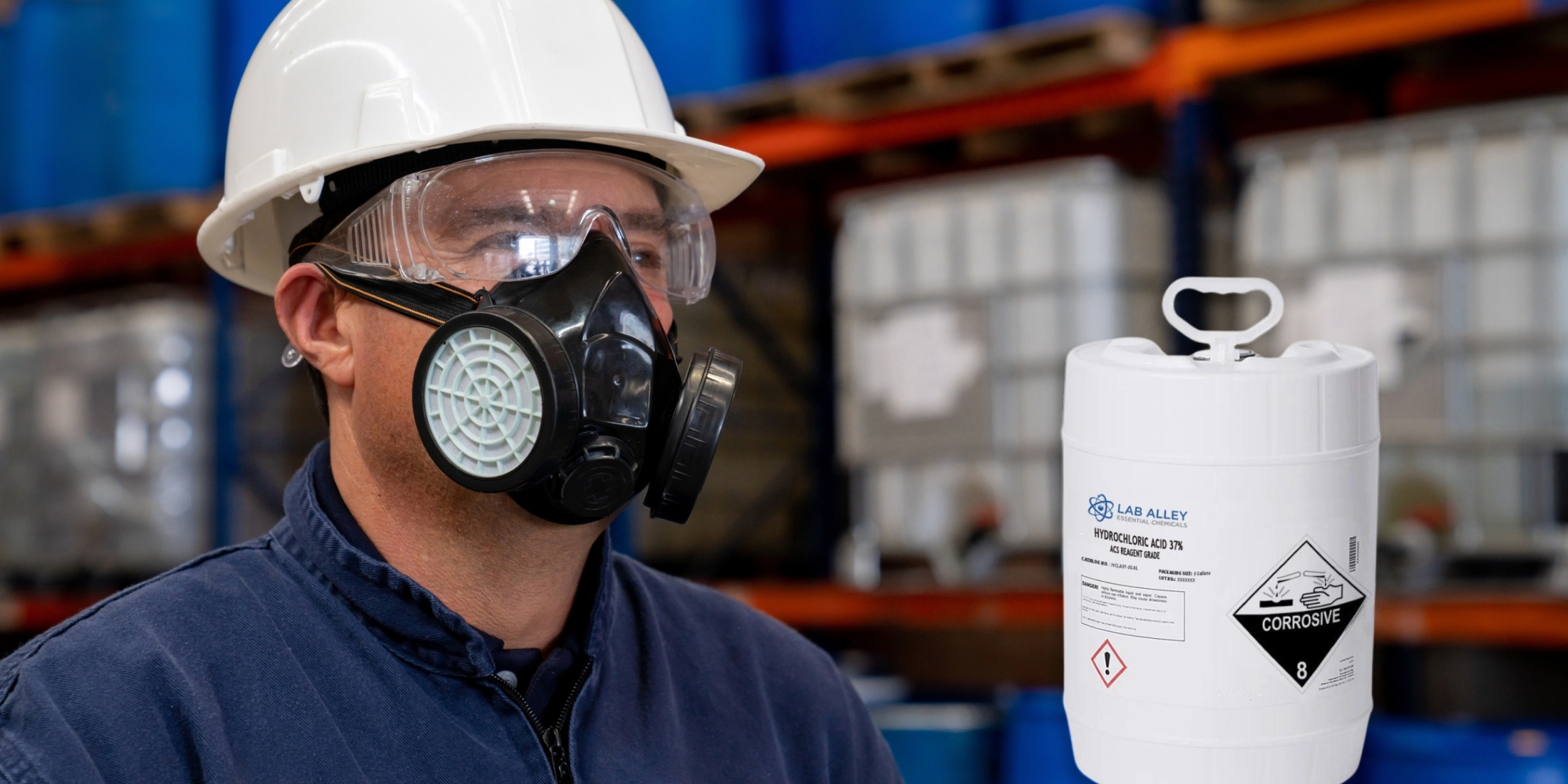What is the Shelf Life of Hydrochloric Acid?

Asking yourself “What is the shelf life of the chemicals being stored in my facility?” is a sign you’re staying on top of important aspects of your business’s non-negotiable legal and safety concerns. Proper storage not only extends the shelf life of your chemicals, but it keeps your workers safe from hazards, and it keeps your business in legal compliance.
In this article, we’re discussing the shelf life of the most popular acidifying agent: hydrochloric acid. Hydrochloric acid, while hazardous, is often preferred to other strong acids because it is relatively less dangerous to work with. We’ll explain what hydrochloric acid is, how long you can expect it to last, and how to extend shelf life and protect your workers through proper storage and disposal.
What is hydrochloric acid?
Hydrochloric acid, or HCl, is one of the seven common strong acids. Other names that have largely fallen out of use include muriatic acid, hydronium chloride, or spirits of salt. Hydrochloric acid is an aqueous solution of HCl in water and appears as a colorless or slightly yellow liquid with a pungent odor. The highest concentration typically manufactured is up to 38% since higher concentrations result in excessive volatile losses in fumes and lead to storage challenges.
In nature, hydrochloric acid makes up the gastric juice in your stomach, allowing for the breakdown of food and the destruction of potentially harmful microbes.
The corrosivity and noxious fumes of hydrochloric acid account for the hazardous nature of this chemical. However, compared to the other acids, it is relatively less hazardous and therefore preferred for applications requiring a strong acid.
Some applications of hydrochloric acid include:
- Synthesis of chloride-containing compounds
- Metal production
- Pickling and cleaning metal products
- Neutralization of bases
- Manufacture of fertilizers and dyes
- Hydrolyzing starch and proteins in food production
- Manufacture of textiles and rubbers
- Production of vinyl chloride for PVC plastic
- Household cleaning
- Production of gelatin
- Descaling
- Leather processing
How long does hydrochloric acid last?
Hydrochloric acid does not readily degrade. Therefore, if it is stored properly, this reagent is expected to last indefinitely. However, manufacturers usually only guarantee a shelf life of 1-2 years. This may be because the manufacturers are also accounting for the shelf life of the bottle itself. Hydrochloric acid is often sold in specially-engineered plastic materials that are designed to withstand the highly corrosive nature of strong acids. However, after some time these bottles themselves may begin to degrade.
Hydrochloric acid stored in screw cap amber glass bottles will remain pure indefinitely. Often times, hydrochloric acid is sold in plastic bottles made of PVC (polyvinyl chloride) or HDPE (High Density Polyethylene). Metal bottle storage is inappropriate as the metal will react with the acid. This includes metal tank fittings or caps.
How to store hydrochloric acid
Hydrochloric acid must be stored away from heat, ignition sources, and direct sunlight. The storage area should be well-ventilated to prevent hazards from fumes. The freezing point of hydrochloric acid solutions are sufficiently low that extreme cold temperatures are not a concern.
Store hydrochloric acid away from incompatible materials, including:
- Oxidizing agents
- Bases
- Metals
- Organic materials
Hydrochloric acid should be kept tightly sealed in its original container.
Safe handling of hydrochloric acid
Always wear personal protective equipment when handling hydrochloric acid, including splash goggles, chemical-resistant gloves, and a lab coat that covers any exposed skin. When diluting acid, always add acid to water (not the other way around), and preferably add the acid below the surface of the water to further mitigate splash risk. Work in a well-ventilated area such as a fume hood. If this is not possible (for example, in the case of a spill) a respirator should be worn.
How to dispose of hydrochloric acid
If improperly stored, hydrochloric acid may need to be disposed of prematurely. Hydrochloric acid should be diluted to a relatively safer concentration and neutralized prior to disposal. This reduces hazards associated with hydrochloric acid and cuts back on hazardous waste costs.
Where to restock on hydrochloric acid
When you’re ready to restock on hydrochloric acid, Lab Alley is pleased to provide you with the highest quality hydrochloric acid available. Shop our easy-to-use website to see our competitive, transparent pricing, as well as multiple size and shipping options. As always, we guarantee fast and speedy delivery for the chemicals that keep your business going.

